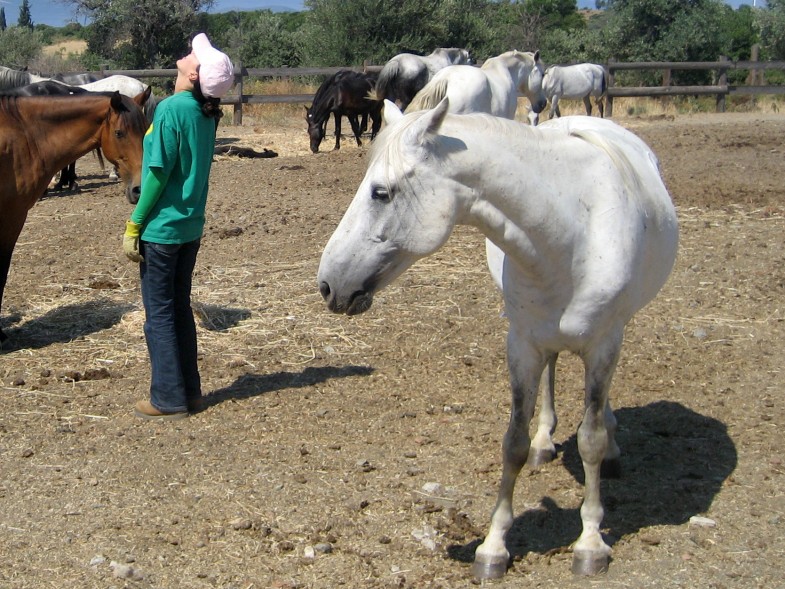WWOOF is a profoundly bad acronym. Sure, it’s useful: it can function, in its various forms, as nearly every part of speech. It’s a verb (“I WWOOFed last summer.”). It’s an adjective (“This is our WWOOF farm.”). It’s a noun (“I am a WWOOFer.”). It’s even a gerund (“My WWOOFing was educational and productive.”). But aside from its strange sound (it is pronounced – yes – like the noise a dog makes), resulting in oft-repeated questions (“You did what this summer?”) it furthermore always sounds – forgive me – but somehow, inexplicably, dirty.
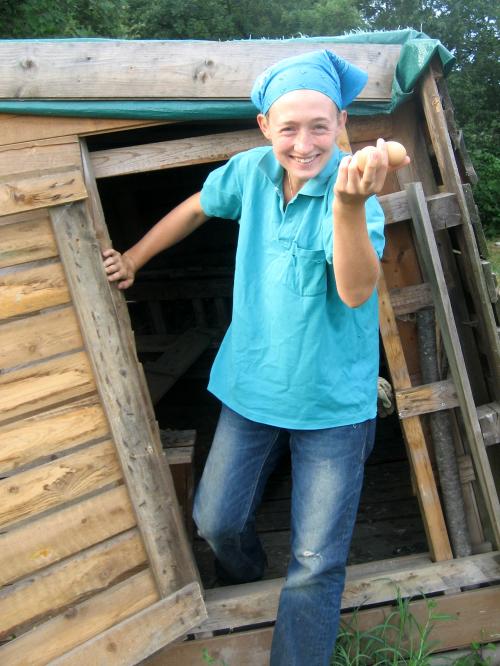
Danielle collecting Italian eggs from Italian hens.
Which is a shame, because WWOOFing is gaining popularity, and you may indeed start hearing it mentioned more often. WWOOF refers to WorldWide Opportunities on Organic Farms, a movement that began in 1971 and has taken hold across the globe. It operates rather simply – say a person would like to try organic farming in country X. She contacts country X’s national WWOOF organization and pays a small membership fee (usually $15-30, give or take). In exchange, she receives a list that describes country X’s farms and the type and amount of work to be done on each. She contacts the farm with her availability dates, the farmers agree, and the lucky WWOOFer shows up on the lucky WWOOF farm at the appointed time. They then adhere to the standard WWOOF agreement: the WWOOFer works in exchange for room and board.
I went WWOOFing for most of summer 2008 with my best friend, Molly. Like any WWOOFers, we went for many reasons, not all of them equally admirable: meeting new people; practicing foreign languages; learning new languages; learning about sustainable agriculture; getting exercise; getting a tan; creating great tell-our-grandkids stories. Perhaps one of the greatest WWOOFing draws is the promise of cheap travel, allowing a person to do it for months (or, in some cases, years) on end, making it perfect for a gap year or the post-college identity crisis (not that I’d know anything about that). It also is an adventure, a way to get your ya-yas out before marriage and kids. Plus, you can make it sound good on all sorts of applications. (As one might guess, WWOOFing is particularly popular among the late-teens to –twenties set.) Furthermore, coming as I do from a farm in rural Iowa, I was excited to see how it was done in other countries.
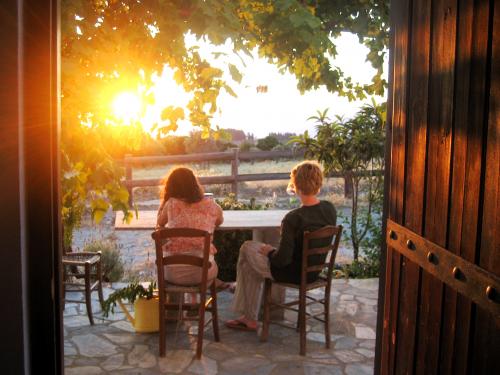
An open air meal at the end of the day in Greece.
Molly and I went to three farms – one each in Greece, Italy, and Spain. And as luck would have it, each farm conveniently provided us with a unique commons-related insight. And so, without further ado, I give you the official summer 2008 WWOOFing commons lessons.
GREECE: At our farm in Greece, our hosts – Marina, Nikos, and their three children – raised horses. To put it simply, Marina and Nikos’ family is one of modest means. As they get nearly all of their income from giving horse tours of their peninsula, most of their money is made in July and August, the height of tourist season. Much of the family’s food comes from their garden or from Nikos’ fishing boat. They do not have electricity connected to their house (to get electricity, Marina told us, would cost over 10,000 Euro), relying instead on a generator. This they run for two hours a day, so they can pump water out of the ground for bathing and watering the garden. With three children to watch, a large garden to tend, horses to herd and pasture, and a home to run, Marina and Nikos simply needed us.
Marina and Nikos’ necessity for WWOOFers emphasized for us something we hadn’t yet considered: while WWOOFing was a luxury for us, it can be valuable in an entirely different way to the farmers involved. In contrast to our WWOOF experience, I present the case of Steve and Monica, a couple of friends of mine who inspired us to go WWOOFing, and the only WWOOFers I had spoken to about the experience before we left. Steve and Monica did their work on farms owned and run by British and American expatriates who were decidedly wealthier than Marina and Nikos. These farms required far less work of my friends, as the stakes were simply not as high; these farmers did not need WWOOFers to get by in day-to-day life, at least not to the degree that we were needed in Greece.
This is not to merit any farms above any others; I personally enjoyed feeling needed, just as Steve and Monica enjoyed a pleasant, more relaxing farming experience. But the current, egalitarian WWOOFing network makes all farms equally available to all WWOOFers, letting individual choice – not price or class – guide WWOOFers and farms to each other.
Imagine, then, a privatized WWOOFing system, with smaller, private WWOOF organizations. If each organization simply charged the highest membership prices they could, organizations may form around classes, not geographical areas – in short, “bargain” WWOOF organizations of frugal farms/WWOOFers versus higher-class organizations of posher farms and richer WWOOFers. WWOOFers with enough money to pay the higher fees of the posh organizations would get placed onto posh farms. More frugal WWOOFers would end up on poorer farms. Or perhaps – even worse than this stratification – in such a system, farms that need WWOOFers to sustain their existence may not get the WWOOFers they need, losing them to the organizations with “nicer” farms.
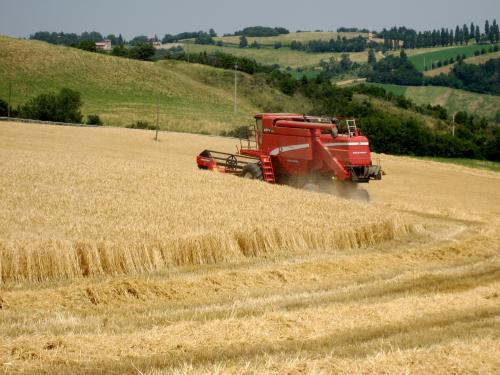
Wheat harvest in Italy.
In this way, the global commons of WWOOFing is alive and well due to its network and person-to-person, “organic” (hah) modus operandi.
ITALY: Our farm in Italy was an agriturismo – a sort of bed-and-breakfast, but attached to a working farm. It was run by Nina and Pietro, two of the most energetic people I have ever known; aside from farming, they each had a side job to make ends meet: Nina taught judo, and Pietro worked as a garbage collector in nearby Bologna.
Living with Nina and Pietro changed my view of what we in America call “eating local.” Until I lived on Nina and Pietro’s farm, I considered the locavore way of life to be merely a trend – the domain of smug, self-righteous American suburbanites wealthy enough to afford the prices at farmers’ markets. I now have a new respect for local food (though don’t get me wrong; as a poor grad student, I will not be purchasing apples for anything over $2 a pound anytime soon).
For Nina and Pietro and their neighbors, sharing goods from one anothers’ farms was a way of life. “Where did we get this wine?” I asked Pietro. “Oh, the people up the hill. We gave them some of our plum preserves in return.” I had countless conversations like this with Nina and Pietro, and I found that in this particular community, “eating local” is not a catchphrase, nor is it a trend; it’s just how things are done. The goods that they produce are sold to tourists in local markets (at prices that, to be honest, seemed high), but they are also traded freely between farms. It allows everyone to share and obtain quality goods, discuss production methods, and promotes community.
Healthy though this system was amongst the farmers, it sounded as if it remained difficult to get locals to buy their goods. Like Nina and Pietro, many other local farmers were required to have other, non-farm sources of income. Nina often lamented this problem: “I don’t understand why people don’t want to support their communities! Why not put money into the local economy?” It was almost with desperation that she asked me, “What do you do in Iowa? How do these things work there?”
In Iowa, of course, we grow soybeans and corn…“we” meaning everyone. There is no diversity of products, and we all make our living from cash crops. By comparison, in Italy, money is made from smaller-scale produce production. With simple inter-farm trading, the farmers do not get the money they need for other necessities. Increased locavore participation would have alleviated their plight.
But I once again reflect on my “poor grad student” comment above, and what I already knew pre-WWOOFing: eating quality, local products can be – indeed, often is – more expensive than buying mass-produced supermarket food. I did not need to go to Italy to learn this. I did, however, need to go to Italy to learn what a shame this is. As far as solutions go, I’ll let you know when I come up with one.
SPAIN: In Spain, we stayed on a dairy cattle farm nestled in a remote part of the Pyrenees. This farm was run by Juan, a middle-aged proud Catalonian farmer who lived with his aging parents and aunt. The work was hard but we took it all in stride, baling hay and scooping cow dung with alacrity and zeal. In the process, we learned a lot about cultural differences and expectations on this farm, specifically with regard to gender.
OK, perhaps I’ll cut the crap: we were women, and this seemed to be a problem (don’t ask why Juan decided to take on female WWOOFers in the first place; we’re still not sure). So we left early. Which brings me to my third point: the importance of trust in the commons.
As in any large-scale commons-based operation, trust is a key player in WWOOFing. WWOOF organizations trust the volunteers to be watchdogs and to file formal complaints against farms that in some way do not live up to the WWOOF agreement. WWOOF volunteers trust that the farms will treat them well. WWOOF farms trust that the volunteers will be enthusiastic, or at least compliant with farmwork orders.
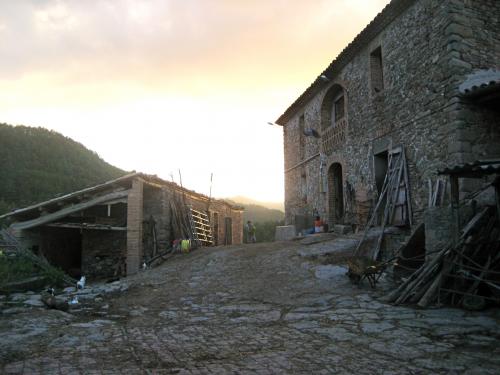
Sunset on the farm in Spain.
And as in any large-scale commons-based operation, there are those who take advantage of the system in some way. Some WWOOFers manage to get their hands on farm contact information without paying the WWOOF organization (these people are, therefore, not technically WWOOFers). Some WWOOFers don’t arrive at their farms at the agreed-upon times (or do not arrive at all), or don’t stay at their farms for the full agreed-upon times, and so on. On the flip side, there are those farms that misrepresent themselves in ways both minor and major.
Because of how things worked out on Juan’s farm, a small part of that WWOOF trust has been damaged. Were we to WWOOF again, Molly and I would think twice about any farm we selected. Likewise, Juan may never again choose to have women work for him, or he may stop trusting WWOOFers altogether. Regardless of who was at fault for this bad situation, we learned something very important: exploitation and disrespect are the ultimate destructors of a commons.
But despite this one unfortunate experience, I can confidently report that, for now, WWOOFing is very much alive and well. It is a beautiful example of a commons that takes place on a global scale, and on multiple functional levels – work, food, shelter, ideas, culture, knowledge are all exchanged in WWOOFing, to everyone’s benefit. It’s not for everyone, it can be difficult, and it’s not a perfect system. But it’s a way to experience the commons across border, across oceans, across continents. And because of that, WWOOFing is certainly worth it.
*************************************
Read the full account of Danielle and Molly’s WWOOFing adventures.
Editor’s note: Danielle worked for several months to help launch this website. She organized hundreds of pages of content into topic areas and corrected formatting and coding with great accuracy. We are very pleased she has stayed in touch with Onthecommons.org and look forward to hearing from her again.



